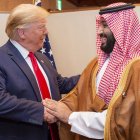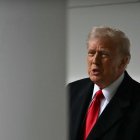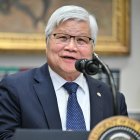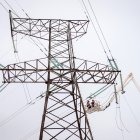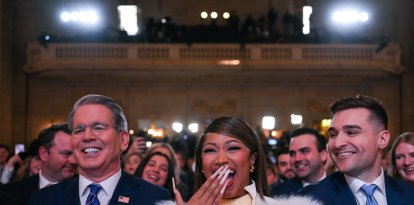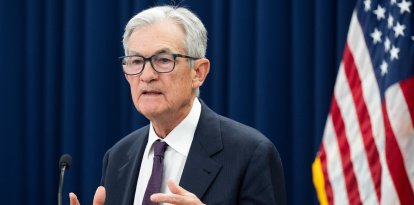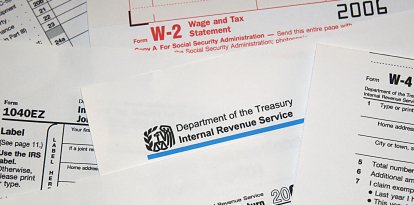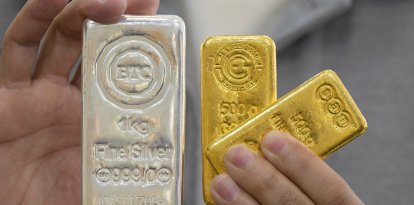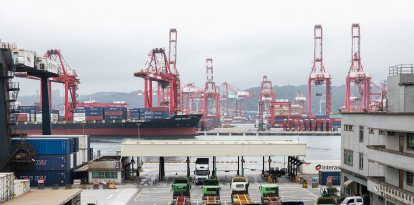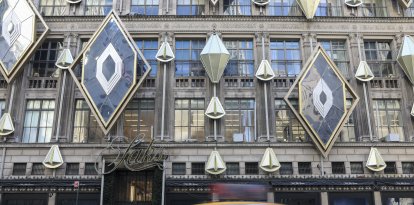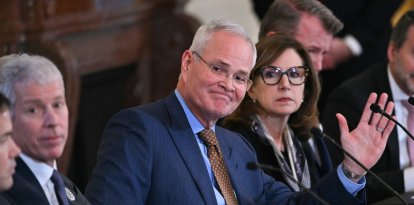ANALYSIS.
From Apple to Hyundai: The multi-billion dollar investments promised in the US after Trump's return to power
The astronomical investments in the United States announced since Donald Trump came to power far exceed the annual GDP of countries such as France, Canada, Spain and Mexico.

Trump's campaign invested $75 million in one particular ad.
The billion-dollar investments in the United States announced since the arrival of Donald Trump to power far exceed the annual GDP of countries such as France, Canada, Spain and Mexico. In recent days, companies such as Hyundai, Johnson & Johnson, and the United Arab Emirates itself have pledged multimillion-dollar sums that will land in American territory in the coming years.
Many of these plans must be translated into concrete aspects, but the White House itself has stressed that the bulk of the money pledged is due to the intention of companies and countries to avoid tariffs, as well as to increase ties with the world's largest market.
Gulf petrodollars land in the U.S.
No sooner had Trump officially assumed the presidency than Saudi Arabia's prime minister and crown prince, Mohammed Bin Salman, congratulated the Republican and announced a $600 billion investment plan in the U.S. The program, which will inject the money over the next four years, was less than clear in early January 2025.
Bin Salman and Rrump maintained a close relationship during the Republican's first term. Diplomacy between the U.S. and Saudi Arabia meant increased military purchases by the country. Saudi Arabia, like the rest of the Persian Gulf countries, are trying to find new revenue wells independent of oil and gas.
Riyadh, Arabia's playground, is also being used for U.S. talks and negotiations with representatives of warring countries.
But Saudi Arabia is not the only country to announce new investments.
The United Arab Emirates (UAE) has also communicated its intention to increase investments in the United States. It recently pledged to put $1.4 trillion into the country over the next 10 years, a White House official revealed.
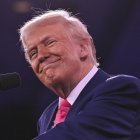
Economy
United Arab Emirates pledges to invest $1.4 trillion in US after meeting with Trump
Diane Hernández
The new framework will "substantially increase the UAE's existing investments in the U.S. economy" in artificial intelligence infrastructure, semiconductors, energy and U.S. manufacturing.
Earlier, the UAE had said it would use its investment arm, XRG, which has an $80 billion portfolio of assets. After a meeting with Trump, everything seems to have changed.
Apple to invest $500 billion
The largest investment announcement coming from a private U.S. firm is Apple’s $500 billion over the next four years in half of the states that make up the country. From factories to data centers, including investment in artificial intelligence and silicon engineering (the raw material of today's computing).
In the deluge of investments announced daily by the White House, this is nothing new. The giant created by Steve Jobs and currently led by Tim Cook is taking advantage of the beginning of a term to announce four-year plans. It has already done so in previous terms of office and promised the same amount of job creation: 20,000 jobs.
In real terms, the amount published by the technology firm is similar to those communicated at the beginning of the terms of office of Joe Biden in 2021 and Donald Trump in 2017.
US pushes the door on artificial intelligence
One of the first multibillion-dollar pledges in Trump's current term was a alliance of three tech firms that promised to mobilize another $500 billion to build a score of data centers. This union, called Stargate, is made up of OpenAI, SoftBank and Oracle.
Trump played master of ceremonies to announce the deal, just on his second day in office as the new U.S. president.
Stargate assured that it would create 100,000 jobs over the next four years of investments.
Artificial intelligence models such as OpenAI's ChatGPT or Google's Gemini require huge amounts of data and computing power to develop and operate. Among the investors in artificial intelligence is Elon Musk, a close ally of the president, who founded xAI last year, already valued at about $50 billion.
Taiwan also looking to buy its protection
The largest microchip maker on the planet, Taiwan Semiconductor Manufacturing Co. (TSMC), has communicated its intention to increase part of its production lines in the United States.
To do so, it will invest an additional $100 billion in its Arizona plant. It represents the largest deployment of foreign direct investment in U.S. history. This figure is on top of the $65 billion announced last year and includes the construction of five more chip factories in the future.
The investments will create some 20,000 jobs.
TSMC, the world's largest semiconductor manufacturer, produces chips for companies such as Apple, Intel and Nvidia.
The Taiwanese government, in parallel, will also increase investments on U.S. soil. The aim is to improve relations with Trump in the face of a possible Chinese invasion of the island, as well as to avoid American tariffs, even if the U.S. does not officially recognize it as a country.
Trump's partners shell out billions
The U.S. administration has touted investment news from allies of Trump since he scored his victory in the 2024 presidential election. Among Trump's friends is Hussain Sajwani, who has communicated his intention to invest $20 billion in data centers through his real estate firm Damac Properties.
The chairman of the Emirati developer personally announced the investment from the U.S. president's residence at Mar-a-Lago. In this regard, Damac owns the only Trump-branded golf course in the entire Middle East.
Ships, automobiles and pharmaceuticals
The investments that have become known in recent weeks come from various coordinates of the economy. Eli & Lilly will make investments amounting to $50 billion in the pharmaceutical industry. The French shipping line CMA CGM will likewise put $20 billion on the table in maritime logistics.
South Korean-based automaker Hyundai pledged a $20 billion investment in U.S. offshoring, including a $5 billion steel plant in Louisiana. The site, valued at $5.8 billion, will be the automaker's first in the U.S. and will produce more than 2.7 million metric tons of steel a year and create more than 1,400 jobs.
It will also supply steel to auto plants in Alabama and Georgia, Trump himself said in remarks from the White House at the project's unveiling.
Not far behind is Johnson & Johnson, which has submitted plans to increase investments in the United States by 25% to more than $55 billion over the next four years, as a threat of drug import tariffs by the Trump administration forces companies to expand their manufacturing operations in the country.
The pharmaceutical giant plans to build four new plants as part of its investment, one of which would be established in Wilson, N.C., where it officially broke ground to honor its proposal. J&J did not disclose where it plans to build the other plants.
However, one of the most important pieces of news came from Stellantis. One of Europe's leading automakers reported that it would reopen its assembly plant in Illinois and increase U.S. production lines through a $5 billion investment.
One of the objectives of the U.S. president is that cars sold in the U.S. should be manufactured there. The automobile industry is being one of the masterpieces for negotiating Trump’s tariffs.
What's missing: Energy and defense
Most of the investing news demands a vital source: energy. Although Trump has wanted to facilitate energy production, particularly from oil and uranium, so far there are few messages from the private sector in this regard.
The most relevant and last known announcement in this sector is that the French giant Schneider Electric will invest more than $700 million in the U.S. energy sector over the next two years.
This would be the largest planned investment in the electric utility's 135-year history in the U.S. market. The European industrial monopoly said the investment would create more than 1,000 new jobs and that the "vast majority" of the capital would go toward manufacturing electrical equipment, including expansions at its factories in Missouri, Ohio and Tennessee.
A less ambitious plan is Clarios' $6 billion R&D plan to develop new energy sources.
Another sector for which new investments are currently unknown is the military industry. A spearhead of U.S. economic diplomacy, half of the war companies in the Stockholm Peace Institute's top 100 are American. While the European rearmament plan will benefit U.S. contractors, there is little sign of them so far.
Memorandum for foreign investment
On Feb. 21, 2025, President Donald J. Trump signed a National Security Presidential Memorandum (NSPM) aimed at promoting foreign investment while protecting U.S. national security interests, particularly from threats posed by foreign adversaries such as the People's Republic of China, the document says.
The NSPM states that welcoming foreign investment is crucial to economic growth, job creation and innovation, ensuring that the United States leverages its world-leading financial markets
It further reports that the U.S. will create an expedited process to facilitate greater investment from specific allies and partners.
The US has also announced a series of tariffs on companies and countries that do not cooperate with the US economy on "fair terms". Many of these investments are motivated by an eagerness to protect themselves from these measures.





